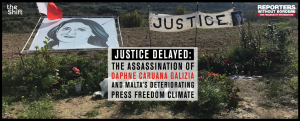The assassination of Daphne Caruana Galizia and Malta’s deteriorating press freedom climate

A full two years on, there has still been no justice for this heinous assassination, which has shed light on broader systemic failings with regard to Malta’s press freedom climate, rule of law, and democratic checks and balances. Over the course of two years, Malta has experienced one of the world’s sharpest declines on Reporters Without Borders’ (RSF’s) World Press Freedom Index, falling 30 places to a current ranking of 77thout of 180 countries. Journalists continuing to pursue public interest investigative reporting in Malta remain at great risk, and citizen journalists and activists who remain vigilant in the campaign for justice are subjected to pressure and abuse.
RSF and The Shift have co-authored this report to examine the circumstances surrounding Caruana Galizia’s assassination, the flawed investigation that followed, the international reaction to date, and the next steps urgently needed to ensure full justice is carried out without further delay. This report has been developed under a project funded by the Justice for Journalists Foundation.
Chapter One outlines the assassination of Daphne Caruana Galizia, background on her courageous investigative journalism, and implications for the safety of journalists and press freedom across Europe. Chapter Two examines the flawed police investigation that followed, and where things currently stand. Chapter Three explores the magisterial inquiry and police interference that has risked compromising it. Chapter Four describes the broader state of press freedom and journalism in Malta, including extensive online trolling, a continued dehumanization campaign, and threats against the press. Chapter Five outlines key reactions and findings of international bodies, and Chapter Six delves into the crucial and urgent need for a public inquiry into Caruana Galizia’s assassination.
At the end of the report, RSF and The Shift have set out a series of recommendations to the Maltese authorities and the international community to ensure full justice is carried out. Crucially, a fully independent and impartial public inquiry must be established without further delay – a step which will require greater political pressure from international organisations such as the Council of Europe, as well as countries with strong bilateral relations with Malta, including the United Kingdom.
RSF and The Shift remain committed to the pursuit of justice for Daphne Caruana Galizia until every person involved in the planning and carrying out of this heinous attack – including the masterminds – are brought to justice.
Trackback dal tuo sito.

 Finanzia la realizzazione di progetti di video inchieste su temi di cronaca nazionale e internazionale. Si rivolge a giovani giornalisti, free lance, studenti e volontari dell’informazione.
Finanzia la realizzazione di progetti di video inchieste su temi di cronaca nazionale e internazionale. Si rivolge a giovani giornalisti, free lance, studenti e volontari dell’informazione.
 Un nuovo progetto editoriale e un bimestrale di Libera e Gruppo Abele, LaViaLibera eredita l'esperienza del mensile Narcomafie, fondato nel 1993 dopo le stragi di Capaci e via D'Amelio.
Un nuovo progetto editoriale e un bimestrale di Libera e Gruppo Abele, LaViaLibera eredita l'esperienza del mensile Narcomafie, fondato nel 1993 dopo le stragi di Capaci e via D'Amelio.
 Articolo 21: giornalisti, giuristi, economisti che si propongono di promuovere il principio della libertà di manifestazione del pensiero (oggetto dell’Articolo 21 della Costituzione italiana da cui il nome).
Articolo 21: giornalisti, giuristi, economisti che si propongono di promuovere il principio della libertà di manifestazione del pensiero (oggetto dell’Articolo 21 della Costituzione italiana da cui il nome).